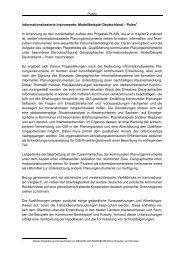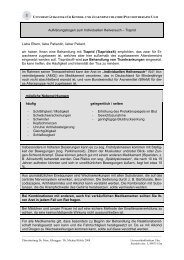- Page 1 and 2:
The Principles of Clinical Cytogene
- Page 4 and 5:
The Principles of Clinical Cytogene
- Page 6 and 7:
v Preface In the summer of 1989, on
- Page 8 and 9:
vii Preface to First Edition The st
- Page 10 and 11:
ix Contents Preface ...............
- Page 12:
Contributors SARAH HUTCHINGS CLARK,
- Page 16:
History of Clinical Cytogenetics 1
- Page 19 and 20:
4 Steven Gersen The hypotonic solut
- Page 21 and 22:
6 Steven Gersen marrow aspiration,
- Page 23 and 24:
8 Steven Gersen 9. Hsu, T.C. (1952)
- Page 25 and 26:
10 Martha Keagle Fig. 1. DNA struct
- Page 27 and 28:
12 Martha Keagle Fig. 3. Transcript
- Page 29 and 30:
14 Martha Keagle Fig. 5. Translatio
- Page 31 and 32:
16 Martha Keagle Fig. 7. The levels
- Page 33 and 34:
18 Martha Keagle single-copy DNA is
- Page 35 and 36:
20 Martha Keagle Fig. 10. Mitosis.
- Page 37 and 38:
22 Martha Keagle Fig. 11. Schematic
- Page 39 and 40:
24 Martha Keagle Fig. 13. Spermatog
- Page 42 and 43:
Human Chromosome Nomenclature 27 IN
- Page 44 and 45:
Human Chromosome Nomenclature 29 Fi
- Page 46 and 47:
Human Chromosome Nomenclature 31 Fi
- Page 48 and 49:
Human Chromosome Nomenclature 33 Ta
- Page 50 and 51:
Human Chromosome Nomenclature 35 Fi
- Page 52 and 53:
Human Chromosome Nomenclature 37 Fi
- Page 54 and 55:
Human Chromosome Nomenclature 39 Fi
- Page 56 and 57:
Human Chromosome Nomenclature 41 Fi
- Page 58 and 59:
Human Chromosome Nomenclature 43 Fi
- Page 60 and 61:
Human Chromosome Nomenclature 45 Fi
- Page 62 and 63:
Human Chromosome Nomenclature 47 In
- Page 64 and 65:
Human Chromosome Nomenclature 49 Ma
- Page 66 and 67:
Human Chromosome Nomenclature 51 Un
- Page 68 and 69:
Human Chromosome Nomenclature 53 Ta
- Page 70 and 71:
Human Chromosome Nomenclature 55 46
- Page 72 and 73:
Human Chromosome Nomenclature 57 nu
- Page 74:
Basic Laboratory Procedures 59 II E
- Page 78 and 79:
Basic Laboratory Procedures 63 INTR
- Page 80 and 81:
Basic Laboratory Procedures 65 amni
- Page 82 and 83:
Basic Laboratory Procedures 67 Prep
- Page 84 and 85:
Basic Laboratory Procedures 69 Fig.
- Page 86 and 87:
Basic Laboratory Procedures 71 Fig.
- Page 88 and 89:
Basic Laboratory Procedures 73 Fig.
- Page 90 and 91:
Basic Laboratory Procedures 75 Fig.
- Page 92 and 93:
Basic Laboratory Procedures 77 Lack
- Page 94:
Basic Laboratory Procedures 79 Once
- Page 97 and 98:
82 Christopher McAleer Fig. 1. Sche
- Page 99 and 100:
84 Christopher McAleer measurements
- Page 101 and 102:
86 Christopher McAleer allow light
- Page 103 and 104:
88 Christopher McAleer High-dry obj
- Page 105 and 106:
90 Christopher McAleer Fig. 3. Sche
- Page 108 and 109:
Quality Control and Quality Assuran
- Page 110 and 111:
Quality Control and Quality Assuran
- Page 112 and 113:
Quality Control and Quality Assuran
- Page 114 and 115:
Quality Control and Quality Assuran
- Page 116 and 117:
Quality Control and Quality Assuran
- Page 118 and 119:
Quality Control and Quality Assuran
- Page 120 and 121:
Quality Control and Quality Assuran
- Page 122 and 123:
Quality Control and Quality Assuran
- Page 124 and 125:
Quality Control and Quality Assuran
- Page 126 and 127:
Quality Control and Quality Assuran
- Page 128 and 129:
Automation in the Cytogenetics Labo
- Page 130 and 131:
Automation in the Cytogenetics Labo
- Page 132 and 133:
Automation in the Cytogenetics Labo
- Page 134 and 135:
Automation in the Cytogenetics Labo
- Page 136 and 137:
Automation in the Cytogenetics Labo
- Page 138 and 139:
Automation in the Cytogenetics Labo
- Page 140 and 141:
Automation in the Cytogenetics Labo
- Page 142 and 143:
Automation in the Cytogenetics Labo
- Page 144 and 145:
Automation in the Cytogenetics Labo
- Page 146 and 147:
Autosomal Aneuploidy 131 III Clinic
- Page 148 and 149:
Autosomal Aneuploidy 133 INTRODUCTI
- Page 150 and 151:
135 Table 1 Parental and Meiotic/Mi
- Page 152 and 153:
Autosomal Aneuploidy 137 Fig. 2. Sc
- Page 154 and 155:
Autosomal Aneuploidy 139 forming ab
- Page 156 and 157:
Autosomal Aneuploidy 141 Fig. 5. Th
- Page 158 and 159:
Autosomal Aneuploidy 143 Fig. 6. Pr
- Page 160 and 161:
Autosomal Aneuploidy 145 Fig. 8. An
- Page 162 and 163:
Autosomal Aneuploidy 147 trisomies,
- Page 164 and 165:
Autosomal Aneuploidy 149 21 and ind
- Page 166 and 167:
Autosomal Aneuploidy 151 molecular
- Page 168 and 169:
Autosomal Aneuploidy 153 Fig. 10. T
- Page 170 and 171:
Autosomal Aneuploidy 155 This marke
- Page 172 and 173:
Autosomal Aneuploidy 157 47. Hawley
- Page 174 and 175:
Autosomal Aneuploidy 159 110. Lindo
- Page 176 and 177:
Autosomal Aneuploidy 161 171. Moghe
- Page 178 and 179:
Autosomal Aneuploidy 163 231. Reese
- Page 180 and 181:
Structural Chromosome Rearrangement
- Page 182 and 183:
Structural Chromosome Rearrangement
- Page 184 and 185:
Structural Chromosome Rearrangement
- Page 186 and 187:
Structural Chromosome Rearrangement
- Page 188 and 189:
Structural Chromosome Rearrangement
- Page 190 and 191:
Structural Chromosome Rearrangement
- Page 192 and 193:
177 Prader-Willi Paternal deletion
- Page 194 and 195:
179 Table 2 Some Recurring Duplicat
- Page 196 and 197:
Structural Chromosome Rearrangement
- Page 198 and 199:
Structural Chromosome Rearrangement
- Page 200 and 201:
Structural Chromosome Rearrangement
- Page 202 and 203:
Structural Chromosome Rearrangement
- Page 204 and 205:
Structural Chromosome Rearrangement
- Page 206 and 207:
Structural Chromosome Rearrangement
- Page 208 and 209:
Structural Chromosome Rearrangement
- Page 210 and 211:
Structural Chromosome Rearrangement
- Page 212 and 213:
Structural Chromosome Rearrangement
- Page 214 and 215:
Structural Chromosome Rearrangement
- Page 216 and 217:
Structural Chromosome Rearrangement
- Page 218 and 219:
Structural Chromosome Rearrangement
- Page 220 and 221:
Structural Chromosome Rearrangement
- Page 222 and 223:
Sex Chromosomes and Sex Chromosome
- Page 224 and 225:
Sex Chromosomes and Sex Chromosome
- Page 226 and 227:
Sex Chromosomes and Sex Chromosome
- Page 228 and 229:
Sex Chromosomes and Sex Chromosome
- Page 230 and 231:
Sex Chromosomes and Sex Chromosome
- Page 232 and 233:
Sex Chromosomes and Sex Chromosome
- Page 234 and 235:
Sex Chromosomes and Sex Chromosome
- Page 236 and 237:
Sex Chromosomes and Sex Chromosome
- Page 238 and 239:
Sex Chromosomes and Sex Chromosome
- Page 240 and 241:
Sex Chromosomes and Sex Chromosome
- Page 242 and 243:
Sex Chromosomes and Sex Chromosome
- Page 244 and 245:
Sex Chromosomes and Sex Chromosome
- Page 246 and 247:
Sex Chromosomes and Sex Chromosome
- Page 248 and 249:
Sex Chromosomes and Sex Chromosome
- Page 250 and 251:
Sex Chromosomes and Sex Chromosome
- Page 252 and 253:
Sex Chromosomes and Sex Chromosome
- Page 254 and 255:
Sex Chromosomes and Sex Chromosome
- Page 256 and 257:
Sex Chromosomes and Sex Chromosome
- Page 258 and 259:
Sex Chromosomes and Sex Chromosome
- Page 260 and 261:
Sex Chromosomes and Sex Chromosome
- Page 262 and 263:
Cytogenetics of Infertility 247 INT
- Page 264 and 265:
Cytogenetics of Infertility 249 Amo
- Page 266 and 267:
Cytogenetics of Infertility 251 Tab
- Page 268 and 269:
Cytogenetics of Infertility 253 gen
- Page 270 and 271:
255 Primary ciliary dyskinesia Auto
- Page 272 and 273:
Cytogenetics of Infertility 257 cha
- Page 274 and 275:
Cytogenetics of Infertility 259 Tab
- Page 276 and 277:
Cytogenetics of Infertility 261 Fig
- Page 278 and 279:
Cytogenetics of Infertility 263 rat
- Page 280:
Cytogenetics of Infertility 265 39.
- Page 283 and 284:
268 Linda Marie Randolph By 1986, m
- Page 285 and 286:
270 Linda Marie Randolph Table 1 Ch
- Page 287 and 288:
272 Linda Marie Randolph Table 4 Th
- Page 289 and 290:
274 Linda Marie Randolph Table 6 Fr
- Page 291 and 292:
276 Linda Marie Randolph rate of 14
- Page 293 and 294:
278 Table 8 Outcome in Early (11-14
- Page 295 and 296:
280 Linda Marie Randolph Table 9 Vo
- Page 297 and 298:
282 Linda Marie Randolph In 1995, O
- Page 299 and 300:
284 Linda Marie Randolph Fig. 1. Il
- Page 301 and 302: 286 Linda Marie Randolph reported c
- Page 303 and 304: 288 Linda Marie Randolph The underl
- Page 305 and 306: 290 Linda Marie Randolph Fig. 3. Ul
- Page 307 and 308: 292 Linda Marie Randolph Fig. 4. Ul
- Page 309 and 310: 294 Linda Marie Randolph Fig. 5. Ul
- Page 311 and 312: 296 Linda Marie Randolph Fig. 6. De
- Page 313 and 314: 298 Linda Marie Randolph Choroid Pl
- Page 315 and 316: 300 Linda Marie Randolph Table 13 C
- Page 317 and 318: 302 Linda Marie Randolph Table 14 U
- Page 319 and 320: 304 Linda Marie Randolph then that
- Page 321 and 322: 306 Table 15 Prenatal Results for R
- Page 323 and 324: 308 Linda Marie Randolph Table 17 O
- Page 325 and 326: 310 Linda Marie Randolph DNA marker
- Page 327 and 328: 312 Linda Marie Randolph XX and XY
- Page 329 and 330: 314 Linda Marie Randolph 54. Simpso
- Page 331 and 332: 316 Linda Marie Randolph 116. Wang,
- Page 333 and 334: 318 Linda Marie Randolph 173. Cicer
- Page 335 and 336: 320 Linda Marie Randolph 232. Benn,
- Page 338 and 339: Cytogenetics of Spontaneous Abortio
- Page 340 and 341: Cytogenetics of Spontaneous Abortio
- Page 342 and 343: Cytogenetics of Spontaneous Abortio
- Page 344 and 345: Cytogenetics of Spontaneous Abortio
- Page 346 and 347: Cytogenetics of Spontaneous Abortio
- Page 348 and 349: Cytogenetics of Spontaneous Abortio
- Page 350 and 351: Cytogenetics of Spontaneous Abortio
- Page 354 and 355: Cytogenetics of Spontaneous Abortio
- Page 356 and 357: Cytogenetics of Spontaneous Abortio
- Page 358 and 359: Cytogenetics of Spontaneous Abortio
- Page 360: Cytogenetics of Spontaneous Abortio
- Page 363 and 364: 348 Xiao-Xiang Zhang Fig. 1. An exa
- Page 365 and 366: 350 Xiao-Xiang Zhang cases availabl
- Page 367 and 368: 352 Xiao-Xiang Zhang Fig. 2. Metaph
- Page 369 and 370: 354 Xiao-Xiang Zhang patients, grea
- Page 371 and 372: 356 Xiao-Xiang Zhang Fig. 5. G-Band
- Page 373 and 374: 358 Xiao-Xiang Zhang Fig. 7. Sister
- Page 375 and 376: 360 Xiao-Xiang Zhang REFERENCES 1.
- Page 378 and 379: Cytogenetics of Hematologic Neoplas
- Page 380 and 381: Cytogenetics of Hematologic Neoplas
- Page 382 and 383: Cytogenetics of Hematologic Neoplas
- Page 384 and 385: Cytogenetics of Hematologic Neoplas
- Page 386 and 387: Cytogenetics of Hematologic Neoplas
- Page 388 and 389: Cytogenetics of Hematologic Neoplas
- Page 390 and 391: Cytogenetics of Hematologic Neoplas
- Page 392 and 393: Cytogenetics of Hematologic Neoplas
- Page 394 and 395: Cytogenetics of Hematologic Neoplas
- Page 396 and 397: Cytogenetics of Hematologic Neoplas
- Page 398 and 399: Cytogenetics of Hematologic Neoplas
- Page 400 and 401: Cytogenetics of Hematologic Neoplas
- Page 402 and 403:
387 Table 5 Association of Recurren
- Page 404 and 405:
389 del(8)(q22) t(8;16)(p11.2;p13)
- Page 406 and 407:
391 +17 -17 2° assoc. with +21 i(1
- Page 408 and 409:
Cytogenetics of Hematologic Neoplas
- Page 410 and 411:
Cytogenetics of Hematologic Neoplas
- Page 412 and 413:
Cytogenetics of Hematologic Neoplas
- Page 414 and 415:
Cytogenetics of Hematologic Neoplas
- Page 416 and 417:
Cytogenetics of Hematologic Neoplas
- Page 418 and 419:
Cytogenetics of Hematologic Neoplas
- Page 420 and 421:
Cytogenetics of Hematologic Neoplas
- Page 422 and 423:
Cytogenetics of Hematologic Neoplas
- Page 424 and 425:
Cytogenetics of Hematologic Neoplas
- Page 426 and 427:
Cytogenetics of Hematologic Neoplas
- Page 428 and 429:
Cytogenetics of Hematologic Neoplas
- Page 430 and 431:
Cytogenetics of Hematologic Neoplas
- Page 432 and 433:
Cytogenetics of Hematologic Neoplas
- Page 434 and 435:
Cytogenetics of Hematologic Neoplas
- Page 436 and 437:
Cytogenetics of Solid Tumors 421 IN
- Page 438 and 439:
423 Aytpical (see well-differentiat
- Page 440 and 441:
Cytogenetics of Solid Tumors 425 So
- Page 442 and 443:
Cytogenetics of Solid Tumors 427 ca
- Page 444 and 445:
Cytogenetics of Solid Tumors 429 do
- Page 446 and 447:
Cytogenetics of Solid Tumors 431 cl
- Page 448 and 449:
Cytogenetics of Solid Tumors 433 Fi
- Page 450 and 451:
Cytogenetics of Solid Tumors 435 Fi
- Page 452 and 453:
Cytogenetics of Solid Tumors 437 Fi
- Page 454 and 455:
Cytogenetics of Solid Tumors 439 no
- Page 456 and 457:
Cytogenetics of Solid Tumors 441 ch
- Page 458 and 459:
Cytogenetics of Solid Tumors 443 Fi
- Page 460 and 461:
Cytogenetics of Solid Tumors 445 8.
- Page 462 and 463:
Cytogenetics of Solid Tumors 447 64
- Page 464 and 465:
Cytogenetics of Solid Tumors 449 11
- Page 466:
Cytogenetics of Solid Tumors 451 17
- Page 469 and 470:
454 Daynna Wolff and Stuart Schwart
- Page 471 and 472:
456 Daynna Wolff and Stuart Schwart
- Page 473 and 474:
458 Daynna Wolff and Stuart Schwart
- Page 475 and 476:
460 Daynna Wolff and Stuart Schwart
- Page 477 and 478:
462 Daynna Wolff and Stuart Schwart
- Page 479 and 480:
464 Daynna Wolff and Stuart Schwart
- Page 481 and 482:
466 Daynna Wolff and Stuart Schwart
- Page 483 and 484:
468 Daynna Wolff and Stuart Schwart
- Page 485 and 486:
470 Daynna Wolff and Stuart Schwart
- Page 487 and 488:
472 Daynna Wolff and Stuart Schwart
- Page 489 and 490:
474 Daynna Wolff and Stuart Schwart
- Page 491 and 492:
476 Daynna Wolff and Stuart Schwart
- Page 493 and 494:
478 Daynna Wolff and Stuart Schwart
- Page 495 and 496:
480 Daynna Wolff and Stuart Schwart
- Page 497 and 498:
482 Daynna Wolff and Stuart Schwart
- Page 499 and 500:
484 Daynna Wolff and Stuart Schwart
- Page 501 and 502:
486 Daynna Wolff and Stuart Schwart
- Page 503 and 504:
488 Daynna Wolff and Stuart Schwart
- Page 506:
Fragile X 491 VI Beyond Chromosomes
- Page 510 and 511:
Fragile X 495 18 Fragile X From Cyt
- Page 512 and 513:
Fragile X 497 Fig. 1. Appearance of
- Page 514 and 515:
Fragile X 499 Table 4 Characteristi
- Page 516 and 517:
Fragile X 501 (KH domains) and clus
- Page 518 and 519:
Fragile X 503 have suggested differ
- Page 520 and 521:
Fragile X 505 The premutation form
- Page 522 and 523:
Fragile X 507 Table 4). FRAXE expan
- Page 524 and 525:
Fragile X 509 35. Heitz, D., Devys,
- Page 526 and 527:
Fragile X 511 93. Bennetto, L. and
- Page 528:
Fragile X 513 147. Oostra, B.A. and
- Page 531 and 532:
516 Jin-Chen Wang Fig. 1. Diagramma
- Page 533 and 534:
518 Jin-Chen Wang (50) and IGF2 (pa
- Page 535 and 536:
520 Jin-Chen Wang 3. Imprinting cer
- Page 537 and 538:
522 Jin-Chen Wang UNIPARENTAL DISOM
- Page 539 and 540:
524 Jin-Chen Wang Fig. 3. A diagram
- Page 541 and 542:
526 Jin-Chen Wang cause SRS (183).
- Page 543 and 544:
528 Jin-Chen Wang Studies comparing
- Page 545 and 546:
530 Jin-Chen Wang upd(21)pat Two ca
- Page 547 and 548:
532 Jin-Chen Wang 25. Ledbetter, D.
- Page 549 and 550:
534 Jin-Chen Wang 84. Bürger, J.,
- Page 551 and 552:
536 Jin-Chen Wang 138. Dryja, T.P.,
- Page 553 and 554:
538 Jin-Chen Wang 192. Karanjawala,
- Page 555 and 556:
540 Jin-Chen Wang 248. Creau-Goldbe
- Page 557 and 558:
542 Sarah Hutchings Clark condition
- Page 559 and 560:
544 Sarah Hutchings Clark the couns
- Page 561 and 562:
546 Sarah Hutchings Clark the coupl
- Page 563 and 564:
548 Sarah Hutchings Clark chromosom
- Page 565 and 566:
550 Sarah Hutchings Clark SMITH-MAG
- Page 567 and 568:
552 Sarah Hutchings Clark often at
- Page 569 and 570:
554 Sarah Hutchings Clark The relat
- Page 571 and 572:
556 Sarah Hutchings Clark Although,
- Page 573 and 574:
558 Sarah Hutchings Clark 33. Nicol
- Page 575 and 576:
560 Index Abnormalities, order of,
- Page 577 and 578:
562 Index Anus, imperforate, 310 AP
- Page 579 and 580:
564 Index CDK4, 394 CDK6, 396 CDKN2
- Page 581 and 582:
566 Index mosaicism, in amniotic fl
- Page 583 and 584:
568 Index Cutaneous anaplastic larg
- Page 585 and 586:
570 Index proximal 15q, 178, t179 p
- Page 587 and 588:
572 Index Folic acid pathway, 75 Fo
- Page 589 and 590:
574 Index Hereditary neuropathy wit
- Page 591 and 592:
576 Index Intrachromosomal recombin
- Page 593 and 594:
578 Index Male-specific region, Y c
- Page 595 and 596:
580 Index MTX, 76 Mucosa-associated
- Page 597 and 598:
582 Index Octamer, 14 Okazaki fragm
- Page 599 and 600:
584 Index Premature separation of s
- Page 601 and 602:
586 Index Recombinant chromosomes n
- Page 603 and 604:
588 Index Sézary syndrome (SS), t3
- Page 605 and 606:
590 Index t(4;14), 475 t(5;10), 375
- Page 607 and 608:
592 Index Treacher Collins syndrome
- Page 609 and 610:
594 Index Xq deletions, 225 Y trans
- Page 611 and 612:
596 Index XX males, 467, f468 and a

















